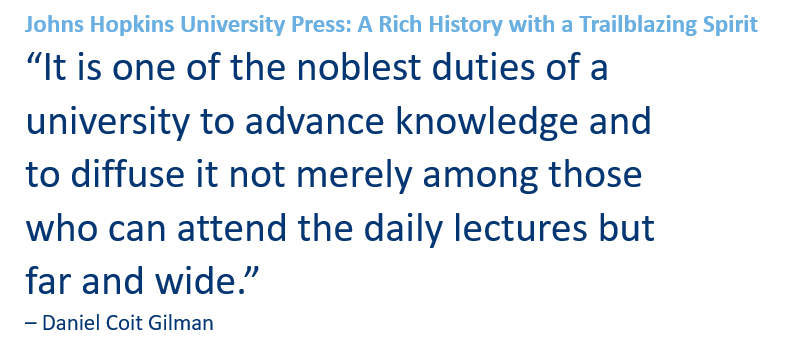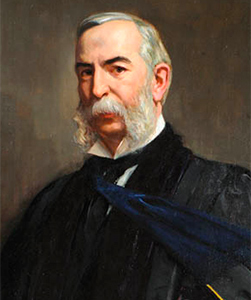History
History of Johns Hopkins University Press
Daniel Coit Gilman, the first president of the Johns Hopkins University, stated plainly that publishing is not just the necessary business of a great research university. It is a duty, and it is a noble undertaking. For nearly a century and a half, Johns Hopkins University Press, along with colleagues throughout the university press community, have worked to interpret and fulfill his enduring and inspiring charge.
To fulfill his vision of sharing knowledge far and wide, Gilman created the Johns Hopkins Publication Agency, housed in the University Library, to assist faculty members in establishing new academic journals. The Press marks its official beginning in 1878, when the Agency began publishing the American Journal of Mathematics under the editorship of the brilliant mathematician J. J. Sylvester. AJM is still published by the Press today.
Other journals followed, and the Agency published its first book, Sidney Lanier: A Memorial Tribute, in 1881 to honor the poet and musician who was an early faculty member. In 1882, Herbert Baxter Adams established the ground-breaking series Johns Hopkins Studies in Historical and Political Science. When the Johns Hopkins School of Medicine opened in 1893, medical publishing by the Press soon followed.

In 1891, the Publication Agency became the Johns Hopkins Press; since 1972, it has been known as Johns Hopkins University Press and more recently, Hopkins Press for short.
Hopkins Fulfillment Services, offering warehousing, fulfillment, and other publishing services, began operations in 1977 and now serves more than a dozen publishing partners.
Project MUSE, which has grown into a massive online collection of journal and books content, launched in 1995 with support from the Andrew W. Mellon Foundation and the National Endowment for the Humanities and in collaboration with the University’s Sheridan Libraries.
Today, operating with this uniquely diverse portfolio of businesses, Hopkins Press is one of the world’s largest university presses. Still inspired by the ideals set forth by President Gilman in 1878, the Press continues to identify, publish, and distribute works that advance new knowledge, benefitting the lives of people worldwide.